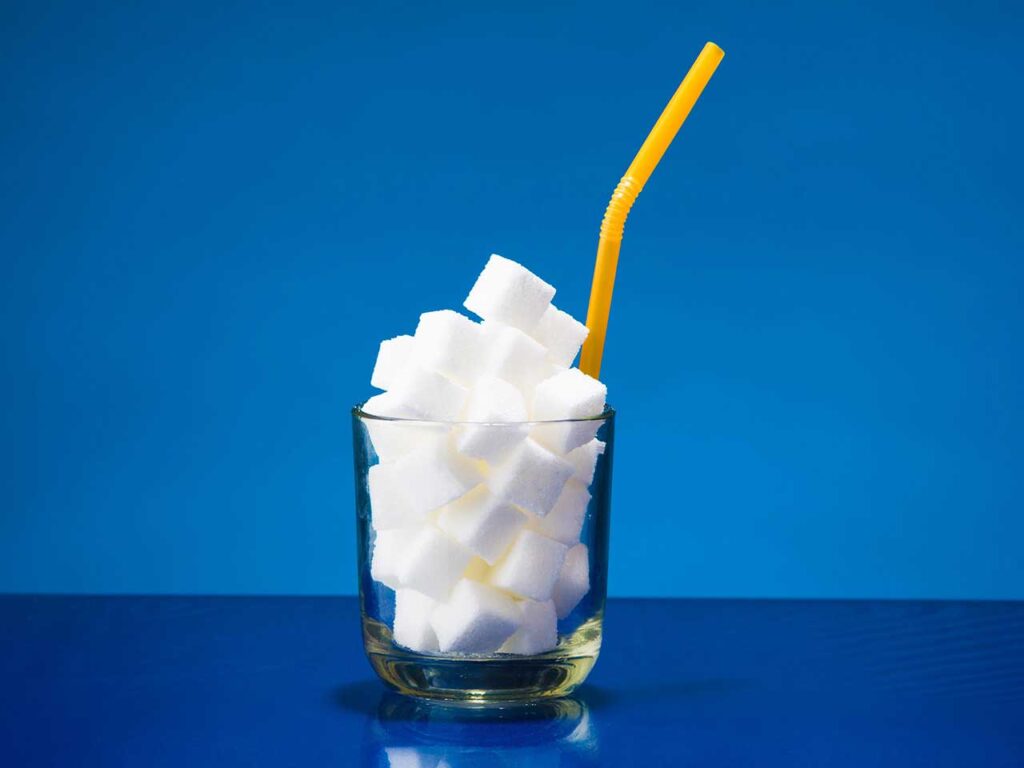As type 2 diabetes is linked to high blood sugar in the blood, it is assumed that eating too much sugar causes diabetes. Sugar consumption alone does not cause diabetes. However, there is a link between type 2 diabetes and being overweight or obese. Consuming foods and beverages that are high in sugar increases weight, which results in the risk of developing type 2 diabetes.
More than 90% of those with diabetes have type 2 diabetes, in which the body becomes resistant to insulin. Type 1 diabetes occurs when the immune system attacks the pancreatic cells that produce insulin.
Consult specialists of Specialty Care Clinics or book an appointment for the treatment of diabetes and learn ways to manage it.
HOW IS SUGAR DIGESTED?
Sugar or sucrose or table sugar is made up of sugarcane or sugar beets. One molecule of glucose and one molecule of fructose are combined to form sucrose. When you consume sucrose, your small intestine’s enzymes separate the glucose and fructose molecules before allowing them to enter your bloodstream. As a result, your blood sugar level increases which signals your pancreas to release insulin. Insulin transports glucose from the bloodstream to your cells, where it can be used as energy. The majority of fructose is carried to your liver where it is converted to either glucose for energy or fat for storage, while a small amount can also be absorbed by cells and used for energy. Excess sugar consumed by your body will be converted into fatty acids and stored as fat.

HOW IS SUGAR RELATED TO DIABETES?
Some research suggests type 2 diabetes risk may even be affected by consuming too many sweetened meals. Eating large amounts of added sugar increases the risk of diabetes. However, there are also other factors that impact the risk such as diet, lifestyle, and genetics.
Consuming sugar in moderation is a part of a balanced diet. According to the American Heart Association, men should consume no more added sugar than 9 teaspoons or 36 grams and women should consume no more than 6 teaspoons or 25 grams daily.
A WHO recommendation is to consume no more than 10% of your daily calories from added sugars.
Several studies have shown a roughly 25% increased risk of type 2 diabetes in people who regularly consume sugar-sweetened beverages. Furthermore, type 2 diabetes rates are highest in countries with the highest sugar intake, while rates are lowest in those with the lowest consumption. While these studies do not clearly prove that sugar causes diabetes, there is a significant connection. Many researchers think that sugar both directly and indirectly raises the chance of developing diabetes. It may increase risk as fructose affects the liver such as promoting fatty liver and localized insulin resistance. Your chance of developing type 2 diabetes may rise as a result of these side effects leading to abnormal insulin production in your pancreas.
Sugar intake indirectly raises the risk as eating a large amount of it may lead to weight gain and an increase in body fat both are risk factors for diabetes.
A person cannot develop type 1 diabetes with any amount of sugar, as it is triggered by an autoimmune reaction and not caused by the metabolic state.
DOES NATURAL SUGAR AFFECT DIABETES?
Natural sugar is a sugar found in fruits and vegetables. The fiber, water, antioxidants, and other nutrients in these types of sugar make them digested and absorbed more slowly and less likely to cause blood sugar spikes.
Though more research is needed about fruit juice and diabetes association, some studies found links between fruit juice and diabetes because of its high sugar and no fiber content.
Some natural sweeteners are pure sources of sugar and contain no fiber. Other sweeteners that are promoted as natural also contain added sugar and should be consumed in moderation.

HOW DO ARTIFICIAL SWEETENERS AFFECT DIABETES?
Artificial sweeteners have been related to the development of insulin resistance and type 2 diabetes even though they don’t cause blood sugar to increase.
There are many theories but it is still not clear why artificial sweetener increases diabetes risk. One theory suggests artificially sweetened foods increase the desire for sweet foods, which increases sugar consumption and weight gain, both of which raise the chance of developing diabetes.
According to another theory, using artificial sweeteners disrupts your body’s ability to compensate for calories eaten from sugar because your brain believes sweet tastes are calorie-free.
HOW TO PREVENT DEVELOPING TYPE 2 DIABETES?
Maintain your weight, eat a balanced diet and check your carbohydrate intake.
- Losing 5- 10% of body weight reduces the risk of diabetes as obesity is the main risk factor of diabetes.
- Replace foods that are high in sugar and refined carbohydrate with fruits and vegetables, whole grains, and lots of water.
- Sedentary lifestyles increase the risk of type 2 diabetes twice as compared to active ones.
- Smokers are at high risk of diabetes.
HOW TO LOWER YOUR DIABETES RISK BY EATING RIGHT?
- Nuts, fruits, vegetables, and whole grains reduce diabetes risk.
- Coffee consumption may lower your risk of type 2 diabetes.
- Eat green leafy vegetables.
- Drinking alcohol in moderation has been related to a 30% reduction in the chance of developing diabetes.
- Eat sweet foods occasionally.
- Avoid drinking sugar.
